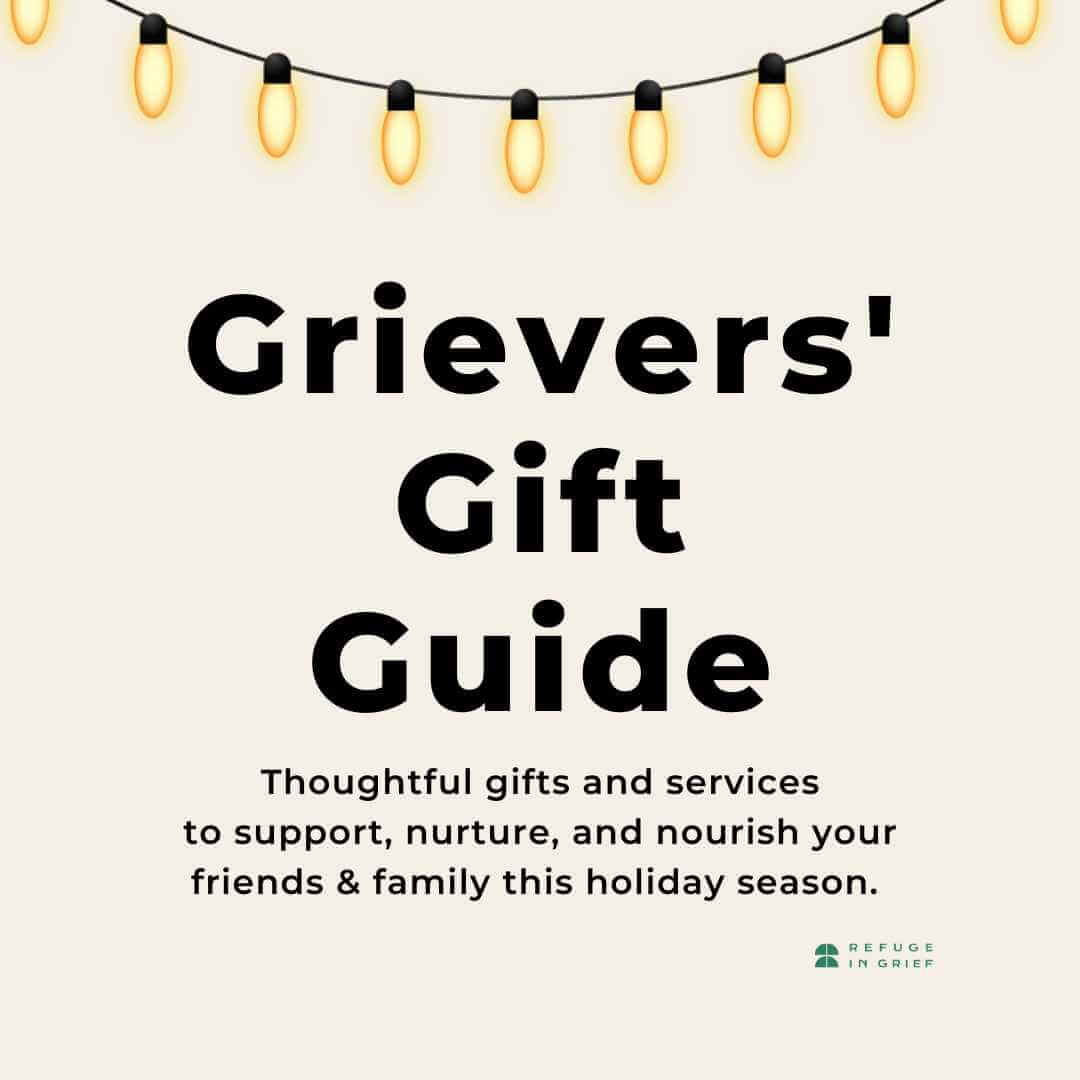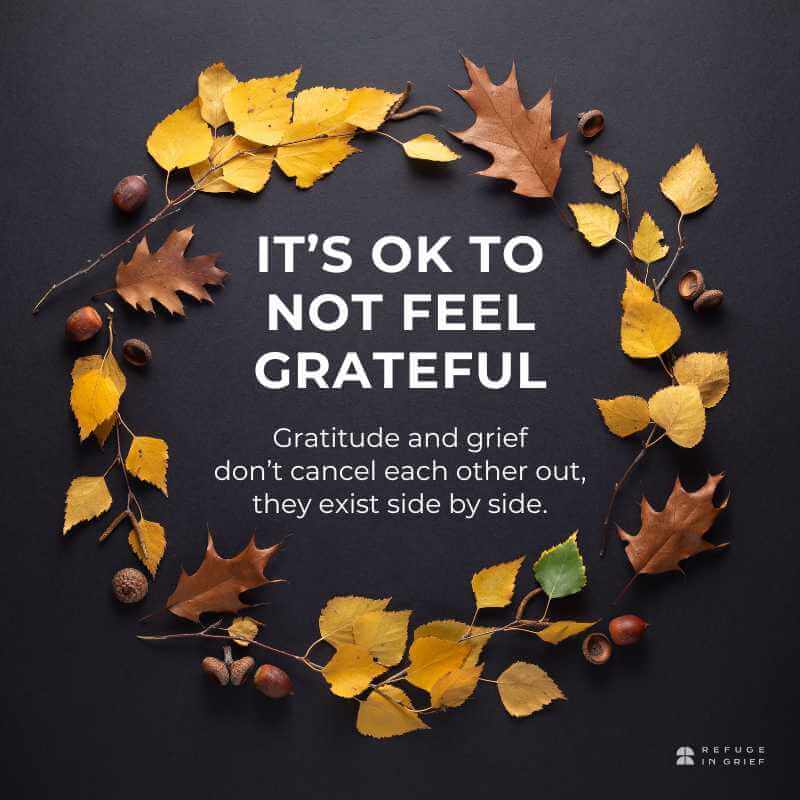Five Ways to Manage Your Grief and Loneliness
Loneliness and isolation are giant causes of suffering for grieving people. Maybe you’re geographically separated from your support system. Or maybe people have stopped reaching out and think they’re respecting your boundaries, not realizing they’re actually leaving you feeling alone. Whatever the reason, loneliness inside grief is both common and normal, and it sucks. Try these five tips on how to cope with that loneliness.
1. Don’t be afraid to talk about your loneliness.
Grief is already a profoundly lonely and isolating experience. Even though it might sound counterintuitive, talking about how hard all of this is, helps. When someone asks how you’re doing or if you need anything, tell them.
Grief culture teaches us to minimize our own pain to make other people feel comfortable. We’re conditioned to say we’re OK when we’re not, to pretend we’re managing our grief and loneliness just fine on our own when what we really need is companionship and understanding.
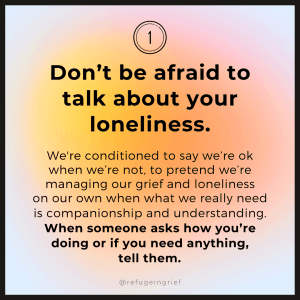 Try saying something like, “I’ve been doing all right, but I’m feeling a bit isolated,” or, “I could really use some company, could we make a date to meet up for coffee or schedule some Zoom time this week?” People are often so wrapped up in their own lives, even more so with everything going on in the world these days, that they may not realize you need more companionship and support than you’re currently getting. This is a great way to let them know what you need.
Try saying something like, “I’ve been doing all right, but I’m feeling a bit isolated,” or, “I could really use some company, could we make a date to meet up for coffee or schedule some Zoom time this week?” People are often so wrapped up in their own lives, even more so with everything going on in the world these days, that they may not realize you need more companionship and support than you’re currently getting. This is a great way to let them know what you need.
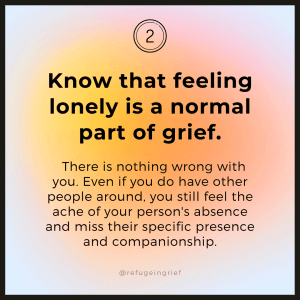
2. Know that feeling lonely is a normal part of grief. There’s nothing wrong with you.
Grief is hard. It impacts every aspect of life, big and small. There are so many things grieving people experience that seem unusual or weird but are actually perfectly normal – including feelings of loneliness.
Even if you have other people around, you aren’t weird if you feel lonely. You’re grieving. You miss the one person you *really* want to be with. It shouldn’t be possible, but that singular absence makes you miss them even more.
Whoever you’re missing right now, feeling the ache of their absence, longing for the days when they were just a room, phone call, or short drive away, and wishing with all your heart that they were here with you instead of grieving alone – all of it is entirely normal.
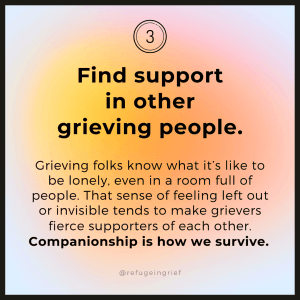
3. Find support in other grieving people.
Grieving people know what it’s like to be lonely, even in a room full of people. Grieving people know what it’s like to feel like the odd one out, the forgotten person, the one people might remember at major holidays but don’t think of on your everyday Tuesday or over the weekend. That sense of feeling left out or invisible tends to make grieving folks fierce supporters of each other.
I’ve never met a kinder community than the community of grievers. When Matt died, I spent months looking for people like me. Jumping from one (then) obscure blog to the next, I found my people. That little family we built – spread all around the world – is what helped me survive. It’s what helped me learn how to cope with the loneliness of grief.
In-person support groups aren’t always an option in much of the country right now, but there are loads of online groups, even for specific types of grief, like child or sibling loss. It’s as true now as it was back then: companionship is how we survive. After death, after loss, after everyone else has returned to their intact lives, the fellowship of other grievers remains.
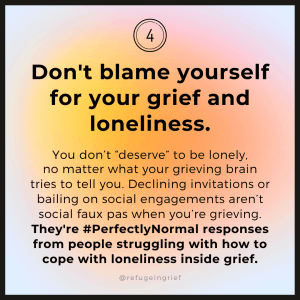 4. Don’t blame yourself for your grief and loneliness.
4. Don’t blame yourself for your grief and loneliness.
You don’t “deserve” to be lonely, no matter what your grieving brain tries to tell you. Maybe you’ve said no to seeing people, going places, or attending events that are too much for you. Maybe you suddenly left a place you thought you could handle, right in the middle of everything. Those are all perfectly normal responses from people struggling with how to cope with loneliness inside grief.
Bailing on a social engagement or declining an invitation for the fourth time aren’t social faux pas when you’re grieving. They’re boundaries that help you hold yourself together when it feels like the world is falling apart all around you. It’s completely normal that loneliness would set in, and not because you missed the chance for companionship over coffee with your friend. It’s because you miss the companionship of your person.
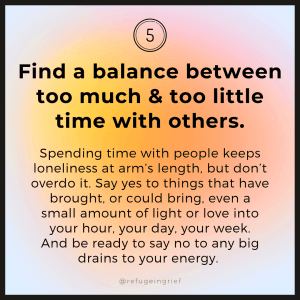
5. Find a balance between too much and too little time with others.
Spending time with people keeps loneliness at arm’s length, but don’t overdo it.
Say yes to things that have brought, or could bring, a small amount of light or love into your hour, your day, your week. Try out that new outdoor yoga group you read about, explore that online support group for new widows. Sit in empty churches in their off hours. Meet your friend for coffee or schedule a Zoom call for tea and a chat. Be willing to gift yourself with doing things that might offer even the smallest respite or support.
And be ready to say no to any big drains to your energy. As it becomes safer to socialize in person, more opportunities will emerge to spend time with others as a way to combat grief and loneliness. I know it’s tempting to accept every invitation because it’s been so long since you could. But RSVP with care. Avoid overload. Seek a balance.
How about you? How is your loneliness level right now? If you’ve reached out to express feelings of loneliness and a need for companionship, how did you express those needs? And how did people respond to you?
Looking for some company inside your grief? In the Writing Your Grief e-course and community you’ll find a place where you can tell the whole truth about how incredibly hard all of this is, without anyone trying to cheer you up or remind you to be grateful for what you have or once had.
As fellow grieving people, we can be there for each other in a way that others simply can’t. Visit this link to learn all about it and find the next open session. We always have room for you.

